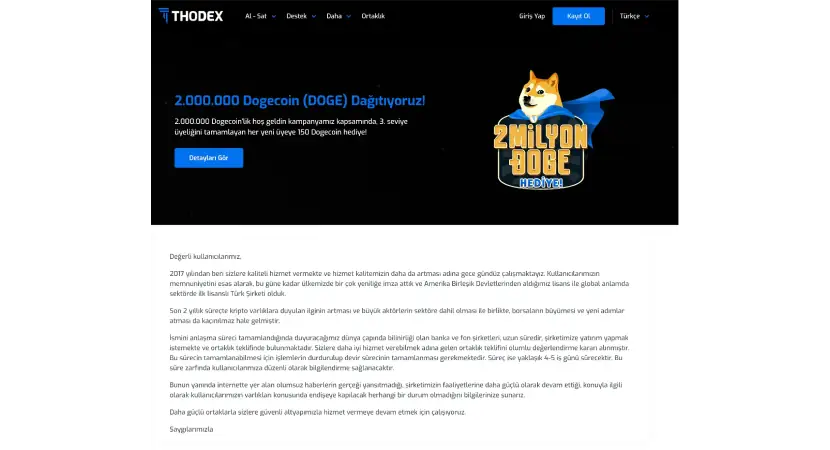Every so often, a new scammer with a slick voice and flashy promises shows up in the crypto space, selling the same worn-out dream of flipping a small investment into massive overnight gains, only to vanish with everyone’s money in yet another copy-paste rug-pull. While they might think they’ve stolen enough to pull off a clean escape and stay out of reach, in most high-profile cases, law enforcement proves them wrong. The crypto industry’s reputation has taken a serious beating over the years, thanks to countless cases of scammers fooling naive investors who, blinded by greed, ignored all the red flags. One of the most infamous examples is the dramatic collapse of a Turkish crypto exchange, led by Faruk Fatih Özer crypto a Turkish entrepreneur and former CEO of a failed crypto exchange called Thodex who was sentenced to 11,196 years in jail after Thodex suddenly shut down in 2021, blocking 400,000 users from accessing their funds and causing an estimated $2 billion in losses. Özer fled to Albania but was arrested in August 2022 and extradited to Turkey in April 2023. In September 2023, he was convicted of fraud, money laundering, and establishing a criminal organization.
Faruk Özer’s Life Before Thodex
Born in 1994, Faruk Fatih Özer developed an early passion for technology and software development, and while helping out at his parents’ print shop in Kocaeli as a teenager, he was driven by big ambitions and a deep desire to become wealthy, not just to support his family, but to achieve something truly great. So confident, Özer dropped out of high school just two years in, insisting that traditional education wouldn’t help him reach his goals.
Before turning 20, he had already launched several tech ventures, including Inline Teknoloji and Game Bridge, both focused on developing mobile games and apps. These ventures were co-created and managed with his brother, Güven, and while the duo didn’t exactly reinvent the wheel, they managed to crack the code for creating addictive apps, ranging from pre-Instagram photo filters to gambling-style games by understanding how to hook users and keep them engaged. “I started to sell almost every product that I thought could make a profit on the internet,” Özer once said, but breaking into the tech industry and racking up millions in profits in Turkey during the 2010s wasn’t exactly easy, even for the most ambitious and relentless entrepreneurs. In Turkey, due to massive inflation and the ongoing devaluation of the Turkish Lira, it’s common for people to store their savings in U.S. dollars or other foreign currencies and cryptocurrency has become widely accepted as an alternative. While talking to friends and family, Özer began to understand how deeply rooted this mindset was, and he saw an opportunity. “During conversations with friends, we realized there were serious gaps in the cryptocurrency exchange sector in Turkey, and that the market was wide open for new players,” Özer said.
Entering the Crypto Space and Launching Thodex
In 2017, as Özer observed growing public distrust in the Turkish Lira, which was taking a major hit due to the country’s economic policies, Bitcoin experienced its first major bull run, soaring from $9,000 to $20,000. The situation pushed people to look for alternatives to preserve the value of their money, and holding their savings in Turkish Lira no longer made sense. At the time, there were no major cryptocurrency exchanges in Turkey and no regulatory oversight. Sensing a golden opportunity, Özer launched Thodex at just 23 years old with His sister Serap as the company’s accountant, and his brother Güven, although he didn’t hold any official position, with an initial investment of only 40,000 Turkish lira (around $11,000 at the time). Özer used every trick in the crypto exchange marketing playbook, from flashy billboards and celebrity endorsements to prime-time TV ads and Istanbul’s first Bitcoin ATM, building one of the biggest crypto brands in the country. As Turkey slid into economic turmoil, investors desperate to preserve the value of their savings and escape the plummeting lira saw Thodex as the perfect solution. Adding another stamp of legitimacy, and as part of Özer’s efforts to expand globally and attract users worldwide, the U.S. Treasury’s Financial Crimes Enforcement Network (FinCEN) granted Thodex a Money Services Business (MSB) registration in 2020, launching Özer into national fame in Turkey.

Simge Sağın was one of the many celebrities Özer used to promote Thodex in a photoshoot
Thodex and Özer’s aggressive ad campaigns, combined with the volatility of the Turkish lira, were remarkably effective. In just a few years, Turkey emerged as a global leader in crypto adoption, with 47% of the adult population reportedly holding some form of cryptocurrency. Özer became a public figure in the local crypto industry, invited to join the board of Blockchain Turkey, attended private meetings with government ministers, and appeared frequently on mainstream news outlets. At its peak, Thodex boasted over 400,000 users and a total transaction volume of $3 billion. While impressive, these numbers still trailed behind local competitors like BtcTurk and Paribu, which consistently outperformed Thodex in active users and trading volume, but that’s where Özer’s positive contributions to the crypto space end. Behind the flashy marketing, the Özer family was orchestrating a massive fraud and money laundering scheme.
It was later revealed that they had been secretly transferring large sums of money abroad in preparation for their escape, well before Thodex collapsed. The exchange was misappropriating real users’ funds, funneling them into shell accounts, making fake withdrawal that were funneled into bank accounts under fabricated user identities, all controlled by Özer himself, to make it appear as though crypto was being exchanged and legally withdrawn, when in fact the funds were being siphoned directly into the family's banks accounts. Thodex’s final promotional campaign, launched in March 2021, promised an airdrop of 2 million Dogecoins to new users in an effort to boost registrations and trading activity. At the time, Dogecoin was surging in popularity, with its price reaching around $0.23, making the total airdrop worth approximately $460,000 and a highly lucrative incentive to attract new users. The giveaway was timed perfectly with growing hype around Dogecoin, culminating in “DogeDay” on April 20, 2021, a date fans believed would trigger a price rally, which did in fact materialize, but there was a catch. Despite the spike in user engagement, the promised Dogecoin airdrop never happened and Shortly after the campaign, Thodex abruptly ceased operations, and Faruk Özer fled the country. The fallout was swift, users realized it had all been a well-orchestrated fraud, leading to widespread allegations of financial misconduct.

Where It All Fell Apart
In early April 2021, pressure was mounting on the Turkish President Recep Tayyip Erdoğan as the Turkish lira had fallen to record lows, and his approval ratings were slipping. In an effort to restore financial stability and win back public confidence, Erdoğan instructed the Central Bank to ban the use of cryptocurrencies for purchasing goods and services. The decision sent shockwaves through the crypto community causing Bitcoin’s price to drop 4.6% following the announcement, as Erdoğan declared that cryptocurrencies were damaging public trust in the Turkish lira. Thodex’s collapse was inevitable for many reasons, and on April 20th, as Dogecoin surged by 20%, Bitcoin hit $63,000, and the platform logged a record-high $538 million in trading volume, Faruk seized the bounceback as an opportunity to steal as much user funds as possible.
That’s when users began noticing issues with their transactions as Thodex initially blamed the disruptions on a supposed cyberattack, but within a day, all trading was halted and users were locked out of their accounts. The website displayed a vague message claiming it was “temporarily closed.” Meanwhile, Faruk Fatih Özer crypto boarded a flight with more than $2 billion in cryptocurrency stored in his personal wallets. The collapse was swift, just days after promoting its Dogecoin giveaway, Thodex was already dismissing rumors of an exchange shutdown, assuring users that everything would return to normal within a few days. It soon became clear that Thodex had no intention of resuming operations or processing withdrawals. The delays were just a stalling tactic, buying time for Faruk Özer and his family to flee the country. In the aftermath, tens of thousands of users realized they had fallen victim to one of the largest rug pulls in Turkey’s crypto history.
Thodex had been a slow rug pull scam, years of hype, only to vanish with users' funds when the time was right. Turkish law enforcement launched an investigation, and within a month, financial crime units froze all Thodex assets and issued arrest warrants for 82 suspects. All were eventually apprehended, except for Faruk Özer himself. Meanwhile, Turkish prosecutors filed formal indictments against 21 of the 82 suspects involved in the Thodex scandal. Had the court found all of them guilty, each could have faced up to 80 life sentences, amounting to over 1,900 years in prison without the possibility of parole. In the end, aside from Faruk Özer, who remained at large at the time, only 4 of the 20 defendants were found guilty, while 16 were acquitted due to insufficient evidence. Among those convicted were Faruk’s sister, Serap Özer, and his brother, Güven Özer as they were found guilty of fraud, money laundering, and running a criminal organization that lured victims through deceptive marketing, stole their funds, and converted the proceeds into physical gold and other cryptocurrencies. Each of them received 11,196 years, 10 months, and 15 days in prison. While the 20 suspects remained in custody awaiting trial, Faruk Özer made a calculated escape from Turkey in April 2021, timing it precisely with Thodex’s sudden suspension of operations.
The Hunt for Faruk Özer
On April 20, Faruk boarded a flight from Istanbul Airport to Tirana, Albania, reportedly carrying a flash drive containing nearly $2 billion in crypto assets, vanishing just as panic began to spread among Thodex users. Upon arriving in Albania, Özer initially checked into the Mondial Hotel in Tirana, but once he learned that Turkish authorities had issued an Interpol Red Notice for his arrest, he quickly went into hiding. He began frequently changing locations across the city to evade capture and make tracking him more difficult. Later, he attempted to reach coastal cities like Vlorë, possibly to arrange a sea escape to Italy. While Faruk was still on the run and listed on Interpol’s Red Notice, an unusual attempt to reduce his legal troubles surfaced. In March 2022, Sevgi Erarslan, a lawyer hired by Özer’s father, tweeted an offer to refund victims of the Thodex but only if they agreed to withdraw their legal complaints against Faruk. She reinforced this offer in interviews with Turkish media outlets claiming that 373 victims had already been compensated and encouraged others to contact her via email to begin the refund process. However, the condition attached, that victims must formally drop their complaints raised serious ethical and legal concerns, as it appeared to be a coordinated effort to weaken the criminal case against Özer and his associates. The timing and nature of the offer sparked widespread speculation, particularly about the origin of the refund funds and whether Özer was still in contact with Erarslan while hiding abroad.

Faruk remained at large for 16 months until August 30, 2022, when Albanian police received an anonymous tip about two suspicious men driving a BMW X5. Once the suspects parked and entered an apartment, police moved in and raided the premises, one of the men was indeed Özer. In the months that followed, Özer fought his extradition to Turkey, but his legal efforts were ultimately unsuccessful and in August 2023, the Albanian government extradited him back to Istanbul into the Turkish authorities. He was charged with founding and leading a criminal organization, aggravated fraud, and laundering property values.

Faruk Fatih Özer crypto is being escorted by personnel from the Cyber Crimes Unit in Istanbul
In the months following prosecutors uncovered that Faruk Özer had refunded some users, possibly out of remorse. But it was too little too late and the financial loss cause his victims was too much as several of them who had lost their life savings tragically took their own lives. One man, who had lost over $100,000, attempted suicide three times, unable to cope with the shame of his financial state as he was forced to work as a security guard just to survive. Faruk later claimed he had emptied his hardware wallet in an effort to repay victims before throwing it into the Ionian Sea. His lawyer, Sevgi Erarslan, argued in court that they had facilitated partial repayments totaling approximately 185 million TRY (around $10 million at the time) to more than 1,000 victims.
Faruk Fatih Özer Sentence
The Istanbul Superior Court was not messing around when it came to cracking down with full effect of the law. Faruk Fatih Özer sentence was 11,196 years 10 months, and 15 days in jail and a fine of 135 million liras (about $5 million) after a Turkish court found him guilty of fraud. He was convicted on multiple charges, including: establishing and managing an organization with the purpose of committing a crime, being a member of an organization, fraud by using information systems as a tool of banks or credit institutions, fraud of merchants or company executives and cooperative managers, and laundering the value of assets resulting from crime. Initially, prosecutors asked for him to be sentenced to 40,562 years in prison. Even though Faruk sentence is largely symbolic, it's meant to reflect the severity of his crimes and the scale of the Thodex scandal. He began serving it in September 2023, however, in January 2025, a Turkish court overturned his conviction for establishing a criminal organization. According to PlasBit’s latest findings, Özer remains in custody as his legal team pursues an appeal and works to reduce the remaining charges. Under Turkey’s legal system, aggravated life imprisonment (ağırlaştırılmış müebbet hapis cezası) is the harshest form of punishment, having replaced the death penalty in 2004. It is reserved for the most serious crimes and entails strict conditions, including solitary confinement and severely limited human contact. In Faruk’s case, parole is not an option unless he is granted a presidential pardon, a legal remedy that is exceptionally rare.
Siblings in Crime: Faruk Fatih Özer Sister and Brother
With Özer captured and four of his conspirators found guilty, you might be wondering what happened to his siblings. Faruk Fatih Özer sister, Serap Özer, served as the accountant of Thodex and received the same sentence of 11,196 years, 10 months, and 15 days in prison, along with a judicial fine of 135 million Turkish liras (approximately $5 million), for her involvement in the exchange’s fraudulent activities. From the court records, it was clear that Serap Özer refused to take responsibility for her role in the scheme. She attempted to downplay her involvement by claiming she had merely shared her bank and crypto exchange account credentials with her brother “out of sheer goodwill,” adding, “I didn’t think he was going to use it.” She portrayed herself as a victim, emphasizing her deteriorating psychological and physical health due to the ordeal. However, her pleas failed to sway the judge, who showed no sympathy. Güven Özer, whose name ironically means "safe", tried to distance himself even further. He insisted he had no real association with Thodex and claimed the only reason he ever visited the company’s office was to drink Turkish tea with his siblings. He described himself as a subcontractor through his advertising agency and said his only “mistake” was sharing his account credentials with Faruk. He even testified that he believed Faruk was traveling to Albania to sellThodex, not flee the country. But despite his efforts to shift the blame, Güven received the same sentence as his siblings: 11,196 years in prison.
The Rise And Fall Of Faruk Fatih Özer Thodex
With only a few crypto exchanges and close to zero regulations, the scene was ripe for a new player. Faruk Fatih Özer Thodex was a Turkish cryptocurrency exchange founded by Faruk in 2017, initially operating under the name Koineks Teknoloji A.Ş, it quickly became one of Turkey's largest crypto trading platforms, serving about 400,000 users with billions in trading volume, it ran until April 2021, suddenly froze trading and users lost access to their funds. After the Thodex collapse, Turkey started to look into ways to regulate cryptocurrency and new regulations were put in place, including banning the use of crypto assets as payment. When all is said and done, Thodex permanently shut down, with no signs of revival. Its brand has become synonymous with greed, fraud, and betrayal and its founder now sits behind bars, along with members of his family. The case caused irreparable harm to thousands of victims and dealt a serious blow to the reputation of the crypto sector in Turkey, a country already grappling with economic turmoil and instability, ironically the very conditions that make crypto such a powerful alternative. Yet, despite the scandal, Turkey continues to rank among the highest in global crypto adoption, proving that even after the dust settles, the belief in decentralized financial solutions remains strong.
More Rug Pulls of Truly Epic Proportions
Thodex wasn’t the only one, here are more notorious rug pulls where both companies and their founders vanished with the money:
● QuadrigaCX and Gerald Cotten - Cotten, founder and CEO of Canadian crypto exchange QuadrigaCX, unexpectedly died in India in 2018. He was the only person with access to the exchange’s cold wallets, which contained over $190 million. Later investigations revealed that Cotten had been running a Ponzi scheme for years, whenever users bought BTC or any other cryptocurrencies, Cotten embezzled the funds and spent them on living a lavish life. As it happens, there are many conspiracy theories regarding his closed-casket funeral, with some suggesting that Cotten is actually alive.
● FTX and Sam Bankman-Fried - Whenever you get a shiny nickname in the crypto community, you know things will take a dark turn. Bankman-Fried, also known as SBF and the golden boy of crypto, built and grew FTX into one of the largest crypto exchanges in the world. However, SBF had another company, Alameda Research, so SBF started funneling investor assets from FTX to his trading firm Alameda, while FTX balance sheets were set up in a way that masked the missing money. Essentially, SBF ran FTX as a bank, taking customer investments as deposits, and used it for gambling at Alameda, Backing it all up with the exchange native token FTT and When the market began to plummet and users started requesting withdrawals, he couldn’t handle the Withdrawal requests and the exchange collapsed. Bankman-Fried was found guilty and started his 25-year prison sentence in March 2024.
● BTC-e and Alexander Vinnik - Co-Founder Vinnik’s shady crypto exchange BTC-e was used for massive money laundering. Between 2011 and 2017, Vinnik laundered over $4 billion, making it a barely concealed laundromat of criminal money, but it still managed to operate for years. Arrested in 2017 and extradited to the USA in 2022, he’s still awaiting trial.
The Real Lesson Behind Thodex
The Thodex saga remains one of the most devastating crypto scandals to date, impacting nearly 391,000 users and wiping out an estimated $2 billion in user funds. What began as a promising exchange ended in betrayal, with its founder fleeing the country and leaving behind a trail of financial ruin. It’s a painful reminder that whether it’s a flashy crypto startup or a traditional bank, when greed takes the wheel, the results are often the same. That’s why many in the crypto space continue to push for decentralization, building systems that rely on code, not trust in individuals. Because at the end of the day, not your keys, not your coins.







